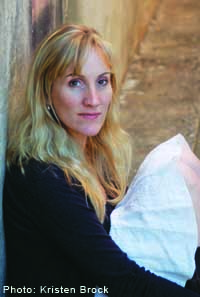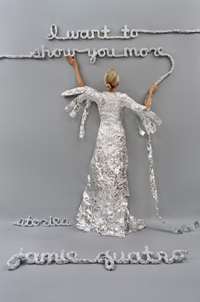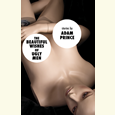Twisted Tales
Jamie Quatro’s stunning debut collection portrays Lookout Mountain in stories that are haunting, provocative, and delightfully weird
Every Wednesday night during the early 1970s, when I was in the fifth and sixth grades, I went with my mother to the bowling alley. She would escape my overbearing father for an evening with her friends, and I would escape into books. Mom always gave me a couple of bucks, and I would walk from the bowling alley’s corner of the shopping center to a dingy bookstore on the far end. Most often, I wound up walking back to the lanes with science fiction—a novel or short-story collection by writers like Kurt Vonnegut, Harlan Ellison, Ray Bradbury, and Philip K. Dick. I would read half the book or more, sitting in a molded plastic chair, surrounded by the white noise of falling pins.
 I soon realized that these authors weren’t really writing about science. Despite the occasional setting on Mars, they were critiquing American life—were in fact critiquing families just like mine. I was secretly thrilled about this revelation: Lord knows my family needed critiquing. And even more thrilling for a twelve-year-old, especially with Vonnegut or Ellison, was the frisson of sexual suggestion. Each story featured a central unreal thing—a world where everyone carries heavy weights in pursuit of equality, a soldier unstuck in time, a magical white suit—but that bit of oddness always turned my bland suburban world upside down. And shook it.
I soon realized that these authors weren’t really writing about science. Despite the occasional setting on Mars, they were critiquing American life—were in fact critiquing families just like mine. I was secretly thrilled about this revelation: Lord knows my family needed critiquing. And even more thrilling for a twelve-year-old, especially with Vonnegut or Ellison, was the frisson of sexual suggestion. Each story featured a central unreal thing—a world where everyone carries heavy weights in pursuit of equality, a soldier unstuck in time, a magical white suit—but that bit of oddness always turned my bland suburban world upside down. And shook it.
These bowling-alley memories came rushing back to me with the clatter of a strike when I read Jamie Quatro’s stunning debut collection, I Want to Show You More. There is little danger that Quatro—who lives in Lookout Mountain, Georgia, and sets the book, her first, on both the Georgia and Tennessee sides of that divided town—will ever be shelved with science-fiction writers. The New York Times, the San Francisco Chronicle, The New Yorker, and many other publications have hailed Quatro as a significant new voice in American literature and rightly so. Yet the odd and beautiful stories in I Want to Show You More are, for the most part, built on the devices of science fiction: a couple who sleep in a bed divided by the decomposing corpse of the wife’s distant lover, a runner who must carry a heavy government-provided trophy through a marathon, a young athlete with a whirlpool in his heart.
These stories are not about Mars. Most are about adultery, especially the variety Jimmy Carter famously confessed to Playboy: “I’ve committed adultery in my heart many times.” More particularly, Quatro captures the general dissatisfaction that drives intelligent, churchgoing suburbanites to engage in electronically enhanced eroticism with distant acquaintances. The central character moving through the book (with occasional digressions) is a woman in her late thirties who spends time phoning, texting, and sending selfies to a man with whom she has no physical relationship. In the stories, as so often in life, these flirtations (not innocent, certainly, yet physically chaste) soon get out of hand, igniting an all-consuming obsession.
The narrator of the first story, “Caught Up,” lays out the parameters of the affair: “Three years ago—seventeen years into this marriage—I fell in love with a man who lives nine hundred miles away.” In the second story, “Decomposition: a Primer for Promiscuous Housewives,” the second-person narrator is carrying a to-go cup of Yogi Calm, walking with her husband at the back of Rock City’s albino deer enclosure, when,
 You take a sip of tea and it’s so hot the skin peels from the roof of your mouth, and it’s this sensation you’ll come to associate with the moment, after months of lying, you finally decide to answer your husband’s question truthfully.
You take a sip of tea and it’s so hot the skin peels from the roof of your mouth, and it’s this sensation you’ll come to associate with the moment, after months of lying, you finally decide to answer your husband’s question truthfully.
You’re in love with him, aren’t you.
Yes, you say, probing a delicate strip of scalded tissue with the tip of your tongue.
This admission somehow transports the lover’s body into the couple’s bed, where he rots through scientifically precise stages of decomposition that no amount of Febreze can erase. It quickly becomes clear to the reader that the dead man is a big, stinking, inescapable metaphor, but it’s just the sort of metaphor that makes the sum of this very contemporary collection much more than the literary exploration of a languishing marriage.
It is worth noting that I Want to Show You More offers a rare instance in which a book can fairly be judged by its cover: the striking dust jacket, designed by Rachel Perry Welty, depicts an attractive woman, her back to the viewer, wearing a formal gown made of aluminum foil. Looking closely at her bare arms, it becomes clear that the model is closer to forty than to twenty. Her arms are raised, her back to the viewer, because she is artfully—and impossibly—shaping a long strip of foil into the cursive title of the book. It is not only cursive, but recursive: a photograph of art making itself, of an artist who is both a creator and an utterly bizarre fictional character, and a perfect visual metaphor for the book itself.
In “What Friends Talk About,” the central character, portrayed this time in the third person, has taken her son to a park, where the boy runs ahead while she is on the phone with her distant lover. She finds her son climbing over the roots of a large oak into which someone has nailed tiny squares of paper. “The squares are aligned in spiraling rows that begin fifteen feet aboveground and twist down the trunk to its base, like a strand of DNA,” Quatro writes. The boy pulls off a square, and the mother reads the words: “I’m sorry.”
Standing beneath her, the boy can see the same blue writing on each of them. He hears his mother say, You won’t believe what I’m looking at. He hears, Some kind of installation art and I’ll call you right back. He watches as his mother backs away from the tree, holding her phone up.
The phone makes its camera sound.
The mother looks down to check the image. It’s blurred.
There is weirdness going on here, the weirdness of a character creating the fictional world in which she resides, of a writer flashing momentarily into our world, turning it upside down, and shaking it.
I want Jamie Quatro to show me more.
[Click here to hear Stephen Usery’s podcast interview with Jamie Quatro for Chapter 16.]
On April 11 at 6:30 p.m., Jamie Quatro will discuss I Want to Show You More at Parnassus Books in Nashville, where she will appear with Jessica Francis Kane, author of This Close. Quatro will also appear on April 18 at the Chattanooga Public Library on April 18 at 9 a.m. as part of the Celebration of Southern Literature, and on April 27 at 2 p.m. at Union Ave. Books in Knoxville.


